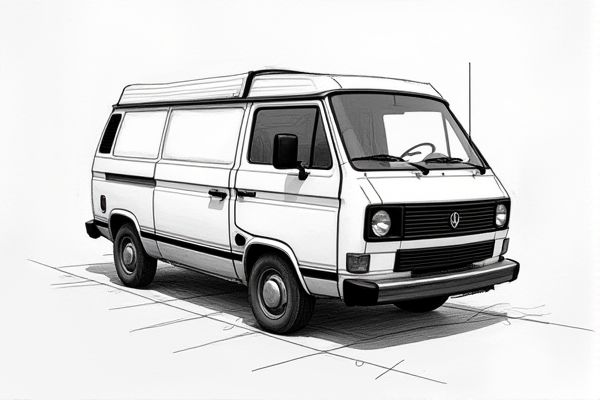When it comes to choosing the perfect van, selecting from the top brands can make all the difference in reliability, functionality, and comfort. The van market offers a variety of options catering to diverse needs, from compact city vans to spacious, high-performance models suitable for long road trips and heavy loads. Factors such as fuel efficiency, technology, safety features, and customization options often determine the standout brands in the industry. Ready to discover the best in the van world? Check out our comprehensive list of top van brands below.

Illustration of vans
Best brands of vans in 2025
Mercedes-Benz
Mercedes-Benz stands out as a leading producer of vans, achieving a record-breaking sales result in 2023 with an 8% increase to 447,800 units, marking the best-ever sales year for the segment. This growth was driven by strong demand in key markets, including Europe and North America, where sales rose by 8% and 13% respectively. In the U.S., Mercedes-Benz Vans saw a 13% increase, reaching an annual sales record of 75,100 units. The commercial van segment was particularly robust, with sales up by 9% to 380,400 units, and electric van sales surged by 51% to 22,700 units. This success underscores Mercedes-Benz Vans' commitment to quality sales growth and electric mobility.
Ford
Ford has solidified its position as a leading producer of vans, particularly with the Ford Transit, which achieved a 60% market share in the full-size van segment in Q1 2024, a significant 18 percentage point increase from the previous year. In the United States, Ford Transit sales rose by 20% to 36,999 units in Q1 2024, while in Canada, sales increased by 11% to 2,813 units, and in Mexico, there was a remarkable 154% increase to 1,070 units. This outstanding performance underscores the Transit's reliability, versatility, and market dominance. The Transit has been the top choice in the full-size van market for over a decade, setting a high standard for competitors. Its sales growth highlights Ford's continued innovation and consumer preference. For more details on the Ford Transit sales, visit their sales report for 2024.
Volkswagen
Volkswagen is a leading producer of vans, with its Commercial Vehicles division experiencing a significant increase in production and sales. In 2023, Volkswagen Commercial Vehicles produced 398,000 vehicles, marking a 13.4% increase from the previous year, and delivered 409,000 units, representing a 24.6% rise. The brand's models, such as the Volkswagen Transporter, have been in production since 1950 and are renowned for their reliability and versatility. Volkswagen's commercial vehicle sales have seen encouraging growth in regions like Western Europe, Central and Eastern Europe, and South America, underscoring the brand's strong position in the global van market.
Ram
Ram Trucks is a leading brand in the van and pickup truck market, with notable achievements such as the Ram 1500 being the top-selling model and the introduction of the Ram Rampage, which achieved a 19.5% market share in the C-segment pickup category just 11 months after its launch in Brazil. In 2022, Ram's Full-size Vans segment accounted for 7% of its total revenue, and the brand holds a significant market share in regions like Canada, where the Ram 1500 is the second best-selling vehicle. Ram also introduced its first fully electrified vehicle, the ProMaster EV Delivery, in January. In the U.S., Ram is the number two truck brand, with sales of 703,023 units in 2019, representing an 18% increase over the previous year. The brand's resilience during economic uncertainties is attributed to strong demand for trucks in the U.S. market. Discover more about their market success and innovations in Ram Trucks statistics.
Chevrolet
Chevrolet, a prominent brand under General Motors, is a significant player in the van market, particularly with its Chevy Express and GMC Savana models. In Q4 2023, Chevrolet Express sales in the U.S. totaled 10,114 units, while GMC Savana sales were 2,527 units, reflecting a market share where the Express outsold the Savana about two-to-one. Chevrolet holds a 10% market share in North America and is expected to generate approximately $49.57 billion in revenue in the U.S. by 2024. The brand's vans are popular for their reliability and versatility, catering to both passenger and cargo needs. Chevrolet's commitment to innovation, such as the introduction of electric and hybrid models, further solidifies its position in the market. For more information, visit the Chevrolet website.
Nissan
Nissan, although no longer a major player in the U.S. van market, had once attempted to make a significant impact with its van lineup, including the NV200 and the full-size NV, introduced in 2009 and 2011 respectively. Despite these efforts, Nissan's van sales failed to gain substantial traction, achieving only an 8% market share by 2019 and selling fewer than 39,000 vehicles in that year. The NV, in its best year, accounted for just 20,022 sales, significantly lower than its competitors like the Chevrolet Express. Nissan has since decided to exit the van business in the U.S. to focus on other segments and streamline its product portfolio. For more details, visit Nissan's exit from the U.S. van business.
GMC
The GMC brand is renowned for its robust and versatile vans, particularly the GMC Savana, which has been in production since 1996 and is mechanically identical to the Chevrolet Express. With over 2.5 million units of the Savana and Express produced, it stands as one of the longest-produced designs in American automotive history. The Savana offers significant cargo capacity, up to 150 cubic feet, and can seat up to 12 passengers, making it a favorite among tradespeople and transportation companies. GMC maintains a steady market share, with the brand holding around 3.7% market share in recent years. The Savana competes against other full-size vans like the Ford Transit and Mercedes-Benz Sprinter. For more detailed sales figures, visit their GMC Savana sales figures page.
Toyota
Toyota stands as a leading producer of vans, evident from its record-breaking sales in 2023, where the Proace family of medium and compact vans achieved a 60% sales growth compared to 2022. The company's light commercial vehicle sales, including the Hilux pick-up which saw a 50% year-on-year increase, contributed significantly to its success. Toyota's expanding Professional range delivered the company's best year yet for light commercial vehicle sales, with a total of 19,764 units sold. This performance solidified Toyota's position in the van market, which is expected to grow at a 3.9% CAGR from 2024 to 2030. Toyota's commitment to quality, durability, and reliability continues to drive its market share and customer loyalty. For more details, visit their official announcement.
Renault
Renault is a leading producer of vans, demonstrating significant growth and market leadership, particularly in the European Light Commercial Vehicle (LCV) market. In 2023, Renault achieved a 19.9% growth in LCV sales, outpacing the broader market's 10.4% growth, and maintained its position as the LCV leader in Europe with a strong performance driven by the success of models like Kangoo, Master, and Trafic, which saw sales increases of 36%, 20%, and 43% respectively. The brand's electrified LCV range, including the All-new Kangoo E-Tech electric and Master E-Tech electric, has been instrumental in meeting customer expectations and aligning with Renault's electrification ambitions. Renault's LCV sales in Europe reached 68,486 units in Q1 2023, contributing to its stable 14.4% market share in the segment. The brand's commitment to innovation and sustainability is evident in its ongoing development of electric and hybrid vehicles. For more information on Renault's strong sales performance driven by new model launches, you can visit their website.
Peugeot
Peugeot has solidified its position as a leading producer of vans, particularly in the electric van market, where its share has increased to 16.97% year-to-date in 2024, with a significant jump of 4.35 percentage points. In July 2024, Peugeot's electric van market share surged to 18.45%, a 14.14 percentage point increase from the same month in 2023. The brand's overall market share across cars and vans stands at 4.5% as of January 2024, up 1.1% points year-on-year. Peugeot's strong performance is also highlighted by its 63% increase in car sales in January 2024 compared to the previous year. The brand's commitment to electric vehicles is evident, with the widest EV line-up of any European mainstream brand. For more details on Peugeot's market performance, visit their press release.
















Leave a Reply
Your email address will not be published.